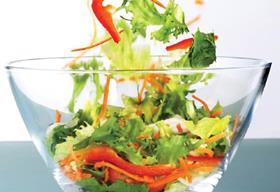
Last month, prepared salads supplier Southern Salads announced it had gone into administration, blaming a “sudden decline in sterling” and a 10-20 per cent fall in its purchasing power for overseas-grown produce following the EU referendum. The company became the fresh produce industry’s first major casualty of the Brexit-related devaluation of the pound.
As a sector that is heavily reliant on imports and migrant labour, prepared produce has arguably been left especially exposed to the instability and uncertainty that has plagued the fresh produce industry since 23 June last year.
In light of this, FPJ contacted major suppliers of prepared salad, prepared fruit and processed fruit to ask how Brexit has affected these three sections of the prepared category, and to find out what concerns they have when it comes to recruitment, import costs and purchasing power going forward.
Prepared salad: Natures Way Foods
Key products: Prepared salads, prepared fruit, coleslaw, potato salad, dressed salads, and fresh food-to-go products
A senior member of the supplier’s HR team says Brexit caused a “dramatic decline” in foreign national applicants but the sector’s united response has given hope for the future…
“In the four weeks leading up to the Brexit vote we saw a dramatic decline in the number of foreign national applicants for production roles in our business. Once the results of the vote were in this drop in applicants continued for another six to eight weeks, with some weeks attracting zero foreign national workers, at which point we started to see a gradual incline. However, the numbers of applicants has not reached the levels pre-Brexit. The instability in the long-term opportunities in the UK are one determinant of this, with the other being the weakness of the pound against the euro.
“One positive aspect of the impact of declining labour availability in the wake of the Brexit referendum has been the way in which the food industry as a whole, from farming to production, is coming together to fully understand the ramifications, both present and future, and to lobby and work with the government to help ministers understand the short-, medium- and long-term impact of decisions that will be made between now and 2019.
“Nature’s Way Foods (NWF) was one of the signatories in a letter to government asking for consideration on freedom of movement for labour within the EU.NWF also hosted the NFU and senior members of Defra to see first-hand the need for EU labour.
“The industry is very clear in saying that clarity is needed sooner rather than later to afford stability both for the migrant workers themselves and for the industry as a whole. The sooner this can be achieved, the better.”
Prepared fruit: PrepWorld
Key products: Strawberries, blueberries, blackberries, pomegranate, kiwi, melon and banana
Christian Thomas, head of sales at the prepared fruit supplier, says PrepWorld is trying to mitigate cost rises and give its workers reasons to stay…
“Our workforcehas many different nationalitiesso we’re doing our best to retain our staff by offering them a competitive wage in a safe and engaged working environment. It’s something that we’re constantly reviewing to make sure we’re viewed as an employer of choice.
“A number of parts of our business are costing us more than they did 12-18 months ago,mainly because of the devaluation of the pound against the euro and the dollar. It’s up to us to try to find ways to mitigate that as much as we can and hopefully build a sustainable business that is able to ride out the challenges.
“All suppliers have a degree of nervousness at the moment because no one really knows what’s going to happen, but it’s not affected us yet in terms of our ability to recruit factory workers. Maybe that’s because our workforce is a bit less seasonal than pickers in the fields. But Brexit aside, there is generally a bit of a shortage of applicants and workers of the right calibre in the sector right now.”
Processed fruit: Fourayes
Key products: Largely Kent-grown ingredients including Bramley apple, berries and rhubarb for use in fruit fillings, jams and purees
Phil Acock, chairman and managing director of the fruit processor, says Brexit has created new export opportunities…
“For us Brexit has been positive. We can do import replacement because imports are now more expensive and we’re also able to start exporting. One of our big growth areas in the next 12 months is going to be in the export of fruit purees, which go into smoothies and things like that.
“We’ll be exporting around 500 tonnes of strawberry puree this year. We’ve got exports going to Holland and the Republic of Ireland already and there’s nowhere in Europe where we don’t feel we could establish some sales.
“The traditional places you’d buy strawberry puree are Spain and Poland, but suddenly, this year, we’re able to offer those products for export from the UK. This is both a direct result of Brexit, and of the fact that the strawberry market in Poland had a bit of a problem with its strawberry crop, which pushed up their prices and made us more competitive. What’s driving demand is the quality of our product and the price of it.
“When you’re faced with Brexit, you can either roll over and just moan about it, or you can say: ‘How am I going to make this work for me?’ That’s what we set about doing and we’ve been very successful in this.”



